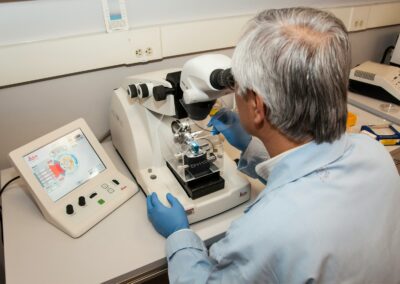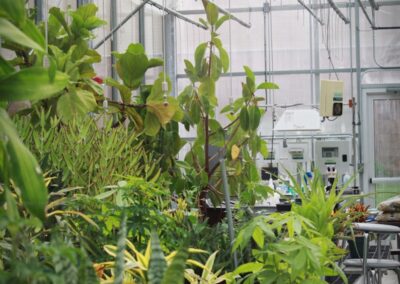Advancing Sustainability: Bio-based Composites in Aircraft Manufacturing
Exploring Sustainable Solutions
The development of bio-based composites, derived from renewable sources like plant fibers and resins, presents a promising opportunity to enhance sustainability in aircraft manufacturing. As the aviation industry continues to seek innovative ways to reduce its environmental footprint, the adoption of these eco-friendly materials holds significant potential. In regions like Saudi Arabia and the UAE, where sustainability initiatives are gaining traction, investing in bio-based composites aligns with the broader goal of promoting environmental stewardship and driving positive change.
Bio-based composites offer several advantages over traditional materials, including lower carbon emissions and reduced reliance on fossil fuels. By harnessing renewable resources such as plant fibers and resins, manufacturers can mitigate the environmental impact of aircraft production while simultaneously enhancing performance and durability. This shift towards sustainable materials reflects a growing awareness of the importance of environmental conservation and underscores the industry’s commitment to responsible practices.
Business Opportunities and Economic Benefits
The integration of bio-based composites in aircraft manufacturing not only contributes to environmental sustainability but also presents compelling business opportunities and economic benefits. For business executives and entrepreneurs, embracing these innovative materials can unlock new markets and drive revenue growth. As consumer preferences shift towards eco-friendly products, airlines and aircraft manufacturers stand to gain a competitive edge by offering sustainable solutions that resonate with environmentally conscious travelers.
Moreover, investing in bio-based composites can lead to cost savings and operational efficiencies in the long run. While initial investments may be higher due to research and development costs, the use of renewable materials can result in lower production costs and reduced reliance on non-renewable resources. This economic sustainability is particularly relevant in regions like Riyadh and Dubai, where economic diversification and resource optimization are key priorities for driving long-term growth.
Challenges and Considerations
Despite the potential benefits of bio-based composites, several challenges and considerations must be addressed to facilitate their widespread adoption in aircraft manufacturing. One significant challenge is the need for scalability and mass production of these materials to meet the demands of the aviation industry. Scaling up production while maintaining quality standards requires investment in infrastructure, technology, and workforce training.
Additionally, regulatory considerations and certification processes play a crucial role in determining the feasibility of bio-based composites for use in aircraft. Ensuring compliance with safety regulations and industry standards is essential to gaining approval for the integration of these materials in commercial aircraft. Collaborative efforts between government agencies, industry stakeholders, and research institutions are needed to streamline the regulatory framework and promote the adoption of sustainable materials.
Additional Considerations
Embracing bio-based composites requires a holistic approach that encompasses not only technological innovation but also cultural and organizational change. Education and awareness initiatives are essential to fostering a culture of sustainability within the industry and driving adoption of eco-friendly practices. By investing in research, development, and training programs, businesses can equip their workforce with the skills and knowledge needed to embrace the transition towards bio-based composites.
Furthermore, collaboration between industry stakeholders, government agencies, and academic institutions is essential to overcoming barriers and accelerating the adoption of sustainable materials. By sharing resources, expertise, and best practices, stakeholders can collectively address challenges related to scalability, certification, and regulatory compliance. Together, they can pioneer new solutions that not only reduce the environmental impact of aircraft manufacturing but also promote economic growth and innovation in the aviation sector.
Conclusion: Pioneering Sustainable Aviation
In conclusion, the development of bio-based composites holds immense promise for revolutionizing aircraft manufacturing and advancing sustainability in the aviation industry. By leveraging renewable sources such as plant fibers and resins, businesses can reduce their environmental impact while capitalizing on new market opportunities and driving economic growth. For business executives, mid-level managers, and entrepreneurs in Saudi Arabia, the UAE, and beyond, embracing bio-based composites represents a strategic investment in the future of sustainable aviation.
As the industry continues to evolve, collaboration and innovation will be key to overcoming challenges and realizing the full potential of bio-based composites. By prioritizing sustainability, fostering partnerships, and leveraging modern technology, the aviation sector can lead the way towards a greener, more resilient future. With concerted efforts and a commitment to environmental stewardship, bio-based composites have the power to transform the way aircraft are manufactured, paving the way for a more sustainable and prosperous aviation industry.
#BioBasedComposites #RenewableSources #AircraftManufacturing #EnvironmentalImpact #ModernTechnology #BusinessSuccess #Leadership #ProjectManagement #SaudiArabia #UAE #Riyadh #Dubai #SustainabilityInAviation























